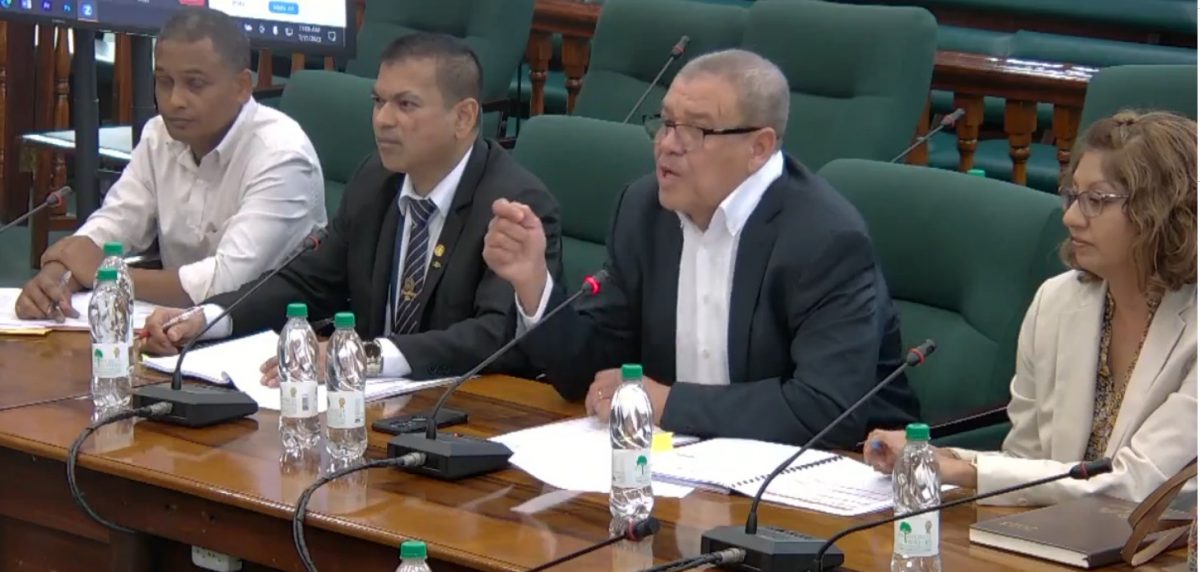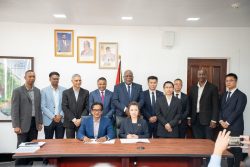Guyana Revenue Authority (GRA) Commissioner-General, Godfrey Statia, told the Public Accounts Committee (PAC) meeting yesterday that it is losing trained and skilled personnel as oil companies are enticing them away with far higher salaries.
Statia made this disclosure in response to a question posed by government PAC member Minister of Public Works, Juan Edghill, about whether there is a deficiency or lack of adequate personnel in place to monitor oil and gas operations offshore. Statia responded, “Minister Edghill, the answer is no, we do not have the full complement of staff. We are working assiduously to get the full complement of staff.”
An increase in salaries was offered to persons functioning in the oil and gas department to remain, but as the organization trains its staff, it loses them. Thus far, five staff who were trained within the past year, all in the accounting field, have left, Statia explained.
Some staff trained in the oil industry were snapped up by CNOOC, ExxonMobil’s partner in the Stabroek Block. Statia said the salaries offered by CNOOC far exceed that paid by the tax agency and above the existing GRA officers.
“To the oil industry, a couple of them were actually snapped up by CNOOC. Whereby their salary is actually way more than mine and my officers.” He added that GRA’s increase in salaries did not convince its staff to remain, which has worsened the agency’s situation as it is already experiencing a shortage of staff. Currently, the oil and gas departmental staff complement is below fifty percent (31) and for its effective functioning the department requires a full complement of 65 persons. However, most of the shortage of staff is in the Cost Recovery section that is under development.
The Guyana Revenue Authority offers the best salaries within the Public Service, according to the GRA Commissioner-General, and while some of staff work for twice the amount of a normal public servant at the same level this did not prevent them from leaving.
The GRA is a key agency in the assessment of whether expenses claimed by oil companies can be justified.
The country is still awaiting the finalisation of two audit reports into the claimed expenses of ExxonMobil’s subsidiary here. One of these is by IHS which found unsubstantiated claims and the other by RHVE.
When Statia was asked by this newspaper in February 2020 about the readiness of his agency for the auditing of future developmental costs and pre-contract costs of other operators, the Commissioner-General was confident that the tax agency will be able to undertake its mandate.
He pointed out that around eight persons from the GRA were working alongside the IHS Markit staff at that point.
He did not give a timeframe of how much training or experience will be needed before the GRA can begin doing audits for the sector on its own but said that he believes that some of his staff are even “better” than the auditors here.
“We will meet a state when we would be self -sufficient. However, we have to ramp up training and they [the operations] ramp up production. We right now have some people who [are] even better than some of the internationalists that try to come and teach us,” he said.
Statia said then that while the agency is only responsible for the tax and customs aspect of the oil and gas contracts, it monitors the current affairs of the sector.
But even as the GRA gains experience, Statia said then that they were executing other duties and had told ExxonMobil that it intended to have a 24/7 presence on the Floating, Production, Storage and Offloading (FPSO) vessel and to make necessary arrangements.
Statia said that all the agencies involved and the operator were working out a system of having staff accommodated for the needed around the clock monitoring, even as it prepares to have livestreaming of operations to its Georgetown office.
“We now have identified the persons who will be going there, whether they should be there on a weekly basis…we are working out that modality, the office space and the types of computers and all sort of things,” he said.










